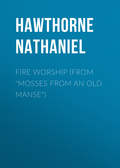
Натаниель Готорн
Twice Told Tales
The malice of his mental disease, the bitterness lurking at the bottom of his heart, mad as he was, for a blighted and ruined life and love that had been paid with cruel scorn, awoke within the breast of Jervase Helwyse. He shook his finger at the wretched girl, and the chamber echoed, the curtains of the bed were shaken, with his outburst of insane merriment.
"Another triumph for the Lady Eleanore!" he cried. "All have been her victims; who so worthy to be the final victim as herself?" Impelled by some new fantasy of his crazed intellect, he snatched the fatal mantle and rushed from the chamber and the house.
That night a procession passed by torchlight through the streets, bearing in the midst the figure of a woman enveloped with a richly-embroidered mantle, while in advance stalked Jervase Helwyse waving the red flag of the pestilence. Arriving opposite the province-house, the mob burned the effigy, and a strong wind came and swept away the ashes. It was said that from that very hour the pestilence abated, as if its sway had some mysterious connection, from the first plague-stroke to the last, with Lady Elcanore's mantle. A remarkable uncertainty broods over that unhappy lady's fate. There is a belief, however, that in a certain chamber of this mansion a female form may sometimes be duskily discerned shrinking into the darkest corner and muffling her face within an embroidered mantle. Supposing the legend true, can this be other than the once proud Lady Eleanore?
Mine host and the old loyalist and I bestowed no little Warmth of applause upon this narrative, in which we had all been deeply interested; for the reader can scarcely conceive how unspeakably the effect of such a tale is heightened when, as in the present case, we may repose perfect confidence in the veracity of him who tells it. For my own part, knowing how scrupulous is Mr. Tiffany to settle the foundation of his facts, I could not have believed him one whit the more faithfully had he professed himself an eyewitness of the doings and sufferings of poor Lady Eleanore. Some sceptics, it is true, might demand documentary evidence, or even require him to produce the embroidered mantle, forgetting that – Heaven be praised! – it was consumed to ashes.
But now the old loyalist, whose blood was warmed by the good cheer, began to talk, in his turn, about the traditions of the Province House, and hinted that he, if it were agreeable, might add a few reminiscences to our legendary stock. Mr. Tiffany, having no cause to dread a rival, immediately besought him to favor us with a specimen; my own entreaties, of course, were urged to the same effect; and our venerable guest, well pleased to find willing auditors, awaited only the return of Mr. Thomas Waite, who had been summoned forth to provide accommodations for several new arrivals. Perchance the public – but be this as its own caprice and ours shall settle the matter – may read the result in another tale of the Province House.
IV.
OLD ESTHER DUDLEY
Our host having resumed the chair, he as well as Mr. Tiffany and myself expressed much eagerness to be made acquainted with the story to which the loyalist had alluded. That venerable man first of all saw lit to moisten his throat with another glass of wine, and then, turning his face toward our coal-fire, looked steadfastly for a few moments into the depths of its cheerful glow. Finally he poured forth a great fluency of speech. The generous liquid that he had imbibed, while it warmed his age-chilled blood, likewise took off the chill from his heart and mind, and gave him an energy to think and feel which we could hardly have expected to find beneath the snows of fourscore winters. His feelings, indeed, appeared to me more excitable than those of a younger man – or, at least, the same degree of feeling manifested itself by more visible effects than if his judgment and will had possessed the potency of meridian life. At the pathetic passages of his narrative he readily melted into tears. When a breath of indignation swept across his spirit, the blood flushed his withered visage even to the roots of his white hair, and he shook his clinched fist at the trio of peaceful auditors, seeming to fancy enemies in those who felt very kindly toward the desolate old soul. But ever and anon, sometimes in the midst of his most earnest talk, this ancient person's intellect would wander vaguely, losing its hold of the matter in hand and groping for it amid misty shadows. Then would he cackle forth a feeble laugh and express a doubt whether his wits – for by that phrase it pleased our ancient friend to signify his mental powers – were not getting a little the worse for wear.
Under these disadvantages, the old loyalist's story required more revision to render it fit for the public eye than those of the series which have preceded it; nor should it be concealed that the sentiment and tone of the affair may have undergone some slight – or perchance more than slight – metamorphosis in its transmission to the reader through the medium of a thoroughgoing democrat. The tale itself is a mere sketch with no involution of plot nor any great interest of events, yet possessing, if I have rehearsed it aright, that pensive influence over the mind which the shadow of the old Province House flings upon the loiterer in its court-yard.
The hour had come – the hour of defeat and humiliation – when Sir William Howe was to pass over the threshold of the province-house and embark, with no such triumphal ceremonies as he once promised himself, on board the British fleet. He bade his servants and military attendants go before him, and lingered a moment in the loneliness of the mansion to quell the fierce emotions that struggled in his bosom as with a death-throb. Preferable then would he have deemed his fate had a warrior's death left him a claim to the narrow territory of a grave within the soil which the king had given him to defend. With an ominous perception that as his departing footsteps echoed adown the staircase the sway of Britain was passing for ever from New England, he smote his clenched hand on his brow and cursed the destiny that had flung the shame of a dismembered empire upon him.
"Would to God," cried he, hardly repressing his tears of rage, "that the rebels were even now at the doorstep! A blood-stain upon the floor should then bear testimony that the last British ruler was faithful to his trust."
The tremulous voice of a woman replied to his exclamation.
"Heaven's cause and the king's are one," it said. "Go forth, Sir William Howe, and trust in Heaven to bring back a royal governor in triumph."
Subduing at once the passion to which he had yielded only in the faith that it was unwitnessed, Sir William Howe became conscious that an aged woman leaning on a gold-headed staff was standing betwixt him and the door. It was old Esther Dudley, who had dwelt almost immemorial years in this mansion, until her presence seemed as inseparable from it as the recollections of its history. She was the daughter of an ancient and once eminent family which had fallen into poverty and decay and left its last descendant no resource save the bounty of the king, nor any shelter except within the walls of the province-house. An office in the household with merely nominal duties had been assigned to her as a pretext for the payment of a small pension, the greater part of which she expended in adorning herself with an antique magnificence of attire. The claims of Esther Dudley's gentle blood were acknowledged by all the successive governors, and they treated her with the punctilious courtesy which it was her foible to demand, not always with success, from a neglectful world. The only actual share which she assumed in the business of the mansion was to glide through its passages and public chambers late at night to see that the servants had dropped no fire from their flaring torches nor left embers crackling and blazing on the hearths. Perhaps it was this invariable custom of walking her rounds in the hush of midnight that caused the superstition of the times to invest the old woman with attributes of awe and mystery, fabling that she had entered the portal of the province-house – none knew whence – in the train of the first royal governor, and that it was her fate to dwell there till the last should have departed.
But Sir William Howe, if he ever heard this legend, had forgotten it.
"Mistress Dudley, why are you loitering here?" asked he, with some severity of tone. "It is my pleasure to be the last in this mansion of the king."
"Not so, if it please Your Excellency," answered the time-stricken woman. "This roof has sheltered me long; I will not pass from it until they bear me to the tomb of my forefathers. What other shelter is there for old Esther Dudley save the province-house or the grave?"
"Now, Heaven forgive me!" said Sir William Howe to himself. "I was about to leave this wretched old creature to starve or beg. – Take this, good Mistress Dudley," he added, putting a purse into her hands. "King George's head on these golden guineas is sterling yet, and will continue so, I warrant you, even should the rebels crown John Hancock their king. That purse will buy a better shelter than the province-house can now afford."
"While the burden of life remains upon me I will have no other shelter than this roof," persisted Esther Dudley, striking her staff upon the floor with a gesture that expressed immovable resolve; "and when Your Excellency returns in triumph, I will totter into the porch to welcome you."
"My poor old friend!" answered the British general, and all his manly and martial pride could no longer restrain a gush of bitter tears. "This is an evil hour for you and me. The province which the king entrusted to my charge is lost. I go hence in misfortune – perchance in disgrace – to return no more. And you, whose present being is incorporated with the past, who have seen governor after governor in stately pageantry ascend these steps, whose whole life has been an observance of majestic ceremonies and a worship of the king, – how will you endure the change? Come with us; bid farewell to a land that has shaken off its allegiance, and live still under a royal government at Halifax."
"Never! never!" said the pertinacious old dame. "Here will I abide, and King George shall still have one true subject in his disloyal province."
"Beshrew the old fool!" muttered Sir William Howe, growing impatient of her obstinacy and ashamed of the emotion into which he had been betrayed. "She is the very moral of old-fashioned prejudice, and could exist nowhere but in this musty edifice. – Well, then, Mistress Dudley, since you will needs tarry, I give the province-house in charge to you. Take this key, and keep it safe until myself or some other royal governor shall demand it of you." Smiling bitterly at himself and her, he took the heavy key of the province-house, and, delivering it into the old lady's hands, drew his cloak around him for departure.
As the general glanced back at Esther Dudley's antique figure he deemed her well fitted for such a charge, as being so perfect a representative of the decayed past – of an age gone by, with its manners, opinions, faith and feelings all fallen into oblivion or scorn, of what had once been a reality, but was now merely a vision of faded magnificence. Then Sir William Howe strode forth, smiting his clenched hands together in the fierce anguish of his spirit, and old Esther Dudley was left to keep watch in the lonely province-house, dwelling there with Memory; and if Hope ever seemed to flit around her, still it was Memory in disguise.
The total change of affairs that ensued on the departure of the British troops did not drive the venerable lady from her stronghold. There was not for many years afterward a governor of Massachusetts, and the magistrates who had charge of such matters saw no objection to Esther Dudley's residence in the province-house, especially as they must otherwise have paid a hireling for taking care of the premises, which with her was a labor of love; and so they left her the undisturbed mistress of the old historic edifice. Many and strange were the fables which the gossips whispered about her in all the chimney-corners of the town.
Among the time-worn articles of furniture that had been left in the mansion, there was a tall antique mirror which was well worthy of a tale by itself, and perhaps may hereafter be the theme of one. The gold of its heavily-wrought frame was tarnished, and its surface so blurred that the old woman's figure, whenever she paused before it, looked indistinct and ghostlike. But it was the general belief that Esther could cause the governors of the overthrown dynasty, with the beautiful ladies who had once adorned their festivals, the Indian chiefs who had come up to the province-house to hold council or swear allegiance, the grim provincial warriors, the severe clergymen – in short, all the pageantry of gone days, all the figures that ever swept across the broad-plate of glass in former times, – she could cause the whole to reappear and people the inner world of the mirror with shadows of old life. Such legends as these, together with the singularity of her isolated existence, her age and the infirmity that each added winter flung upon her, made Mistress Dudley the object both of fear and pity, and it was partly the result of either sentiment that, amid all the angry license of the times, neither wrong nor insult ever fell upon her unprotected head. Indeed, there was so much haughtiness in her demeanor toward intruders – among whom she reckoned all persons acting under the new authorities – that it was really an affair of no small nerve to look her in the face. And, to do the people justice, stern republicans as they had now become, they were well content that the old gentlewoman, in her hoop-petticoat and faded embroidery, should still haunt the palace of ruined pride and overthrown power, the symbol of a departed system, embodying a history in her person. So Esther Dudley dwelt year after year in the province-house, still reverencing all that others had flung aside, still faithful to her king, who, so long as the venerable dame yet held her post, might be said to retain one true subject in New England and one spot of the empire that had been wrested from him.
And did she dwell there in utter loneliness? Rumor said, "Not so." Whenever her chill and withered heart desired warmth, she was wont to summon a black slave of Governor Shirley's from the blurred mirror and send him in search of guests who had long ago been familiar in those deserted chambers. Forth went the sable messenger, with the starlight or the moonshine gleaming through him, and did his errand in the burial-grounds, knocking at the iron doors of tombs or upon the marble slabs that covered them, and whispering to those within, "My mistress, old Esther Dudley, bids you to the province-house at midnight;" and punctually as the clock of the Old South told twelve came the shadows of the Olivers, the Hutchinsons, the Dudleys – all the grandees of a bygone generation – gliding beneath the portal into the well-known mansion, where Esther mingled with them as if she likewise were a shade. Without vouching for the truth of such traditions, it is certain that Mistress Dudley sometimes assembled a few of the stanch though crestfallen old Tories who had lingered in the rebel town during those days of wrath and tribulation. Out of a cobwebbed bottle containing liquor that a royal governor might have smacked his lips over they quaffed healths to the king and babbled treason to the republic, feeling as if the protecting shadow of the throne were still flung around them. But, draining the last drops of their liquor, they stole timorously homeward, and answered not again if the rude mob reviled them in the street.
Yet Esther Dudley's most frequent and favored guests were the children of the town. Toward them she was never stern. A kindly and loving nature hindered elsewhere from its free course by a thousand rocky prejudices lavished itself upon these little ones. By bribes of gingerbread of her own making, stamped with a royal crown, she tempted their sunny sportiveness beneath the gloomy portal of the province-house, and would often beguile them to spend a whole play-day there, sitting in a circle round the verge of her hoop-petticoat, greedily attentive to her stories of a dead world. And when these little boys and girls stole forth again from the dark, mysterious mansion, they went bewildered, full of old feelings that graver people had long ago forgotten, rubbing their eyes at the world around them as if they had gone astray into ancient times and become children of the past. At home, when their parents asked where they had loitered such a weary while and with whom they had been at play, the children would talk of all the departed worthies of the province as far back as Governor Belcher and the haughty dame of Sir William Phipps. It would seem as though they had been sitting on the knees of these famous personages, whom the grave had hidden for half a century, and had toyed with the embroidery of their rich waistcoats or roguishly pulled the long curls of their flowing wigs. "But Governor Belcher has been dead this many a year," would the mother say to her little boy. "And did you really see him at the province-house?" – "Oh yes, dear mother – yes!" the half-dreaming child would answer. "But when old Esther had done speaking about him, he faded away out of his chair." Thus, without affrighting her little guests, she led them by the hand into the chambers of her own desolate heart and made childhood's fancy discern the ghosts that haunted there.
Living so continually in her own circle of ideas, and never regulating her mind by a proper reference to present things, Esther Dudley appears to have grown partially crazed. It was found that she had no right sense of the progress and true state of the Revolutionary war, but held a constant faith that the armies of Britain were victorious on every field and destined to be ultimately triumphant. Whenever the town rejoiced for a battle won by Washington or Gates or Morgan or Greene, the news, in passing through the door of the province-house as through the ivory gate of dreams, became metamorphosed into a strange tale of the prowess of Howe, Clinton or Cornwallis. Sooner or later, it was her invincible belief, the colonies would be prostrate at the footstool of the king. Sometimes she seemed to take for granted that such was already the case. On one occasion she startled the townspeople by a brilliant illumination of the province-house with candles at every pane of glass and a transparency of the king's initials and a crown of light in the great balcony-window. The figure of the aged woman in the most gorgeous of her mildewed velvets and brocades was seen passing from casement to casement, until she paused before the balcony and flourished a huge key above her head. Her wrinkled visage actually gleamed with triumph, as if the soul within her were a festal lamp.
"What means this blaze of light? What does old Esther's joy portend?" whispered a spectator. "It is frightful to see her gliding about the chambers and rejoicing there without a soul to bear her company."
"It is as if she were making merry in a tomb," said another.
"Pshaw! It is no such mystery," observed an old man, after some brief exercise of memory. "Mistress Dudley is keeping jubilee for the king of England's birthday."
Then the people laughed aloud, and would have thrown mud against the blazing transparency of the king's crown and initials, only that they pitied the poor old dame who was so dismally triumphant amid the wreck and ruin of the system to which she appertained.
Oftentimes it was her custom to climb the weary staircase that wound upward to the cupola, and thence strain her dimmed eyesight seaward and countryward, watching for a British fleet or for the march of a grand procession with the king's banner floating over it. The passengers in the street below would discern her anxious visage and send up a shout: "When the golden Indian on the province-house shall shoot his arrow, and when the cock on the Old South spire shall crow, then look for a royal governor again!" for this had grown a by-word through the town. And at last, after long, long years, old Esther Dudley knew – or perchance she only dreamed – that a royal governor was on the eve of returning to the province-house to receive the heavy key which Sir William Howe had committed to her charge. Now, it was the fact that intelligence bearing some faint analogy to Esther's version of it was current among the townspeople. She set the mansion in the best order that her means allowed, and, arraying herself in silks and tarnished gold, stood long before the blurred mirror to admire her own magnificence. As she gazed the gray and withered lady moved her ashen lips, murmuring half aloud, talking to shapes that she saw within the mirror, to shadows of her own fantasies, to the household friends of memory, and bidding them rejoice with her and come forth to meet the governor. And while absorbed in this communion Mistress Dudley heard the tramp of many footsteps in the street, and, looking out at the window, beheld what she construed as the royal governor's arrival.
"Oh, happy day! Oh, blessed, blessed hour!" she exclaimed. "Let me but bid him welcome within the portal, and my task in the province-house and on earth is done." Then, with tottering feet which age and tremulous joy caused to tread amiss, she hurried down the grand staircase, her silks sweeping and rustling as she went; so that the sound was as if a train of special courtiers were thronging from the dim mirror.
And Esther Dudley fancied that as soon as the wide door should be flung open all the pomp and splendor of bygone times would pace majestically into the province-house and the gilded tapestry of the past would be brightened by the sunshine of the present. She turned the key, withdrew it from the lock, unclosed the door and stepped across the threshold. Advancing up the court-yard appeared a person of most dignified mien, with tokens, as Esther interpreted them, of gentle blood, high rank and long-accustomed authority even in his walk and every gesture. He was richly dressed, but wore a gouty shoe, which, however, did not lessen the stateliness of his gait. Around and behind him were people in plain civic dresses and two or three war-worn veterans – evidently officers of rank – arrayed in a uniform of blue and buff. But Esther Dudley, firm in the belief that had fastened its roots about her heart, beheld only the principal personage, and never doubted that this was the long-looked-for governor to whom she was to surrender up her charge. As he approached she involuntarily sank down on her knees and tremblingly held forth the heavy key.
"Receive my trust! Take it quickly," cried she, "for methinks Death is striving to snatch away my triumph. But he comes too late. Thank Heaven for this blessed hour! God save King George!"
"That, madam, is a strange prayer to be offered up at such a moment," replied the unknown guest of the province-house, and, courteously removing his hat, he offered his arm to raise the aged woman. "Yet, in reverence for your gray hairs and long-kept faith, Heaven forbid that any here should say you nay. Over the realms which still acknowledge his sceptre, God save King George!"
Esther Dudley started to her feet, and, hastily clutching back the key, gazed with fearful earnestness at the stranger, and dimly and doubtfully, as if suddenly awakened from a dream, her bewildered eyes half recognized his face. Years ago she had known him among the gentry of the province, but the ban of the king had fallen upon him. How, then, came the doomed victim here? Proscribed, excluded from mercy, the monarch's most dreaded and hated foe, this New England merchant had stood triumphantly against a kingdom's strength, and his foot now trod upon humbled royalty as he ascended the steps of the province-house, the people's chosen governor of Massachusetts.
"Wretch, wretch that I am!" muttered the old woman, with such a heartbroken expression that the tears gushed from the stranger's eyes. "Have I bidden a traitor welcome? – Come, Death! come quickly!"
"Alas, venerable lady!" said Governor Hancock, lending her his support with all the reverence that a courtier would have shown to a queen, "your life has been prolonged until the world has changed around you. You have treasured up all that time has rendered worthless – the principles, feelings, manners, modes of being and acting which another generation has flung aside – and you are a symbol of the past. And I and these around me – we represent a new race of men, living no longer in the past, scarcely in the present, but projecting our lives forward into the future. Ceasing to model ourselves on ancestral superstitions, it is our faith and principle to press onward – onward. – Yet," continued he, turning to his attendants, "let us reverence for the last time the stately and gorgeous prejudices of the tottering past."
While the republican governor spoke he had continued to support the helpless form of Esther Dudley; her weight grew heavier against his arm, but at last, with a sudden effort to free herself, the ancient woman sank down beside one of the pillars of the portal. The key of the province-house fell from her grasp and clanked against the stone.
"I have been faithful unto death," murmured she. "God save the king!"
"She hath done her office," said Hancock, solemnly. "We will follow her reverently to the tomb of her ancestors, and then, my fellow-citizens, onward – onward. We are no longer children of the past."
As the old loyalist concluded his narrative the enthusiasm which had been fitfully flashing within his sunken eyes and quivering across his wrinkled visage faded away, as if all the lingering fire of his soul were extinguished. Just then, too, a lamp upon the mantelpiece threw out a dying gleam, which vanished as speedily as it shot upward, compelling our eyes to grope for one another's features by the dim glow of the hearth. With such a lingering fire, methought, with such a dying gleam, had the glory of the ancient system vanished from the province-house when the spirit of old Esther Dudley took its flight. And now, again, the clock of the Old South threw its voice of ages on the breeze, knolling the hourly knell of the past, crying out far and wide through the multitudinous city, and filling our ears, as we sat in the dusky chamber, with its reverberating depth of tone. In that same mansion – in that very chamber – what a volume of history had been told off into hours by the same voice that was now trembling in the air! Many a governor had heard those midnight accents and longed to exchange his stately cares for slumber. And, as for mine host and Mr. Bela Tiffany and the old loyalist and me, we had babbled about dreams of the past until we almost fancied that the clock was still striking in a bygone century. Neither of us would have wondered had a hoop-petticoated phantom of Esther Dudley tottered into the chamber, walking her rounds in the hush of midnight as of yore, and motioned us to quench the fading embers of the fire and leave the historic precincts to herself and her kindred shades. But, as no such vision was vouchsafed, I retired unbidden, and would advise Mr. Tiffany to lay hold of another auditor, being resolved not to show my face in the Province House for a good while hence – if ever.







